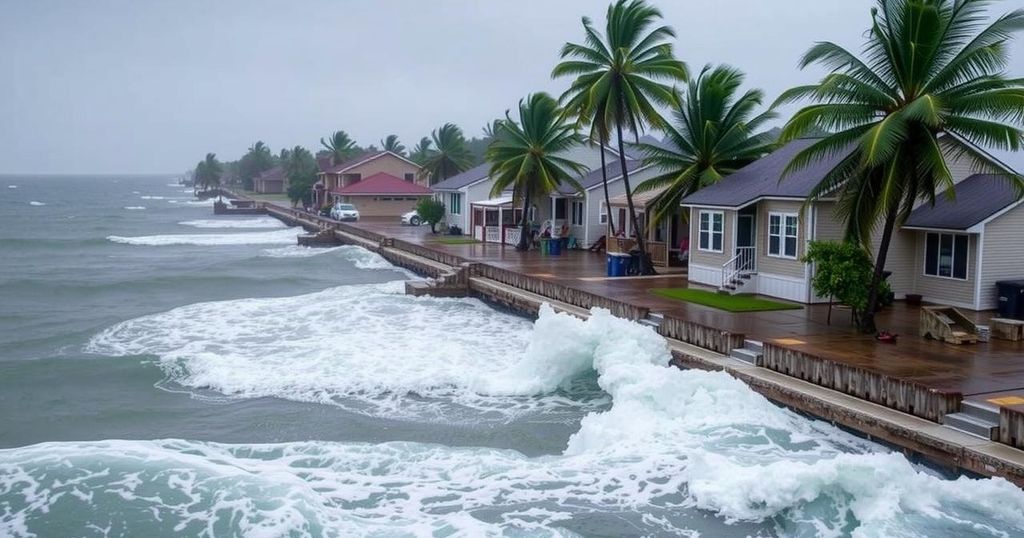World news
AFRICA, AM, CROSS, EMERGENCY RESPONSE, EMMANUEL MACRON, EUROPE, FRANCE, FRENCH RED CROSS, HURRICANE BERYL, IFRC, INTERNATIONAL FEDERATION OF RED CROSS AND RED CRESCENT SOCIETIES, MA, MAMOUDZOU, MAYOTTE, MOZAMBIQUE, NATURAL DISASTER, NATURAL DISASTERS, RED CROSS, SOUMAILA
Marisol Gonzalez
0 Comments
Cyclone Chido Devastates Mayotte and Mozambique; Red Cross Volunteers Missing
Tropical Cyclone Chido has caused devastation in Mayotte and Mozambique, with at least 22 confirmed deaths in Mayotte and fears that the total may reach thousands. Over 200 Red Cross volunteers are missing. In Mozambique, at least 34 have perished, with the cyclone severely affecting 174,158 people. Political discussions on immigration and disaster preparedness are intensifying, especially with President Macron’s impending visit to Mayotte.
Tropical Cyclone Chido has resulted in a rising death toll in both Mozambique and the French territorial archipelago of Mayotte. Initial reports indicate at least 22 fatalities in Mayotte with fears that the total could reach into the thousands, as emergency services grapple with extensive destruction and humanitarian needs. The French Red Cross reported over 200 of its humanitarian volunteers are currently unaccounted for. As local authorities work tirelessly to restore essential services amid severe disruptions, the French government is mobilizing support, forecasting restored water supplies and aid distribution within the next few days. Meanwhile, political tensions escalate over immigration and the government’s handling of overseas territories, particularly following President Emmanuel Macron’s planned visit to Mayotte, scrutinizing the regional response to the crises.
In Mozambique, the cyclone has added to existing humanitarian challenges, with at least 34 confirmed deaths as reports of property destruction mount. Approximately 174,158 people have been affected by the cyclone’s aftermath, facing dire living conditions due to the combination of winds exceeding 260 kph and significant rainfall. This disaster underscores the vulnerability of both territories to severe weather events exacerbated by climate change.
Amidst the devastation, the focus remains on immediate recovery efforts, restoring basic needs such as food and water while assessing the long-term implications of these repeated climate disasters on socioeconomic conditions.
The emergence and rapidly increasing impact of Tropical Cyclone Chido underscore the vulnerability of island territories and coastal regions such as Mayotte and Mozambique to extreme weather events. In addition to the physical destruction caused by the cyclone, significant social and humanitarian challenges arise, particularly for impoverished populations and marginalized communities. The situation in Mayotte is further complicated by longstanding issues of illegal immigration and public health concerns as many individuals remained resistant to seeking shelter amid the cyclone. The response efforts illustrate the dire need for strategic disaster preparedness and resilience planning in regions increasingly susceptible to climate change—prompting urgent dialogue regarding governmental accountability and support for affected populations.
In conclusion, Tropical Cyclone Chido has wrought extensive devastation in both Mayotte and Mozambique, contributing to a rising casualty count and significant humanitarian crises. The challenges faced are not only physical but also political, with increased scrutiny on how the French government manages its overseas territories. As efforts to provide relief continue, the broader implications of climate change and social vulnerability become increasingly critical in assessing future disaster responses and recovery strategies.
Original Source: www.abc.net.au




Post Comment